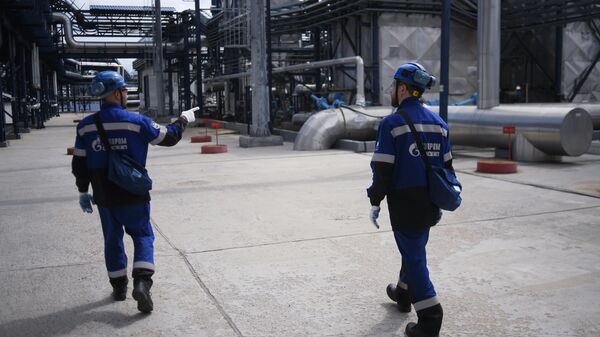https://sputniknews.com/20230304/africa-is-becoming-new-market-for-russian-oil-products-amid-eu-embargo-report-says-1108021214.html
Africa is Becoming New Market for Russian Oil Products Amid EU Embargo, Report Says
Africa is Becoming New Market for Russian Oil Products Amid EU Embargo, Report Says
New buyers from Africa have doubled their imports of Russian fuels in February, following the EU’s embargo on oil and refined petroleum products from Russia, according to data provided by S&P Global Commodities at Sea.
2023-03-04T17:30+0000
2023-03-04T17:30+0000
2023-03-04T17:30+0000
africa
russia
eu sanctions
western sanctions against russia
oil export
oil prices
oil
/html/head/meta[@name=’og:title’]/@content
/html/head/meta[@name=’og:description’]/@content
https://cdnn1.img.sputniknews.com/img/07e7/03/04/1108021337_0:180:3001:1868_1920x0_80_0_0_b332516f8bd141ee6df362e8bd276a5e.jpg
New buyers from Africa doubled their imports of Russian fuel in February, following the European Union’s embargo on oil and refined petroleum products from Russia, according to data provided by S&P Global Commodities at Sea.The EU imposed a ban on the purchase and import of seaborne Russian crude oil starting from December last year. Early last month, an EU ban on imports of refined petroleum products from Russia, including diesel and jet fuel, came into effect. The moves are ostensibly part of Western efforts to cut off Russian fossil fuels from their economies, end their energy dependence on Russia, and limit Moscow’s sources of funds.The agency noted that following the sanctions, in February this year, Europe’s imports of Russian fuels plummeted significantly. In general, the impact of the embargo was seen in the diesel and fuel oil markets. Last month, Russian diesel exports decreased by over 100,000 barrels per day (b/d) to 830,000 b/d, while fuel oil exports slumped by 170,000 b/d from the previous month to 614,000 b/d. As for the destinations, flows of Russian fuel to Europe fell from approximately 1.5 million b/d in December to less than 500,000 b/d in February. At the same time, the very structure of Russian oil product exports in regard to the main buyers has changed. According to the agency, Turkey, the UAE, and China are now the biggest importers of Russian fuels, as about 35% of all the country’s oil product exports are now headed to these states. The agency noted that African buyers include Morocco, Algeria, Nigeria, Senegal, Tunisia, Ghana, and Egypt. In February, these countries increased Russian fuel imports to 440,000 b/d.As for Russian crude oil exports, the agency noted that they “remained resilient” in February, as the country managed to redirect large volumes of its crude to other states, in particular to India. Russian-origin crude loadings averaged 3.31 million b/d, down 8% from January levels. Last month, a leading US-based newspaper reported that North African countries, namely Tunisia and Morocco, had increased imports of diesel and other refined petroleum products from Russia. In January, Tunisia acquired 2.8 million barrels of Russian oil products, while Moroccan imports of Russian diesel stood at two million barrels. The newspaper stressed that North African nations had “picked up the slack,” as Russia is now largely cut off from the European market. In response to the situation, Russia has been increasing its cooperation in the energy field with its African partners. Moreover, the development of oil production and refining on the continent through Russian investment will be one of the key topics of the upcoming Russia-Africa summit, which is slated to be held in July in St. Petersburg.Furthermore, according to NJ Ayuk, the head of the African Energy Chamber, Russia could take the lead in assisting energy projects in Africa.
https://sputniknews.com/20230227/african-nations-reportedly-boost-russian-oil-imports-amid-eu-sanctions-1107841257.html
africa
russia
Sputnik International
feedback@sputniknews.com
+74956456601
MIA „Rosiya Segodnya“
2023
News
en_EN
Sputnik International
feedback@sputniknews.com
+74956456601
MIA „Rosiya Segodnya“
Sputnik International
feedback@sputniknews.com
+74956456601
MIA „Rosiya Segodnya“
africa, russia, oil, oil refinary products, oil production, eu sanctions, embargo
africa, russia, oil, oil refinary products, oil production, eu sanctions, embargo
Western sanctions that were imposed on Russia following the onset of the country’s special military operation in Ukraine, among other things, have targeted Russian hydrocarbons, including crude oil and petroleum products. Against this backdrop, Moscow has been forced to diversify its export destinations and explore new markets.
New buyers from Africa doubled their imports of Russian fuel in February, following the European Union’s embargo on oil and refined petroleum products from Russia, according to data provided by S&P Global Commodities at Sea.
The EU imposed a ban on the purchase and import of seaborne Russian crude oil starting from December last year. Early last month, an EU ban on imports of refined petroleum products from Russia, including diesel and jet fuel, came into effect. The moves are ostensibly part of Western efforts to cut off Russian fossil fuels from their economies, end their energy dependence on Russia, and limit Moscow’s sources of funds.
The agency noted that following the sanctions, in February this year, Europe’s imports of Russian fuels plummeted significantly. In general, the impact of the embargo was seen in the diesel and fuel oil markets. Last month, Russian diesel exports decreased by over 100,000 barrels per day (b/d) to 830,000 b/d, while fuel oil exports slumped by 170,000 b/d from the previous month to 614,000 b/d.
As for the destinations, flows of Russian fuel to Europe fell from approximately 1.5 million b/d in December to less than 500,000 b/d in February.
At the same time, the very structure of Russian oil product exports in regard to the main buyers has changed. According to the agency, Turkey, the UAE, and China are now the biggest importers of Russian fuels, as about 35% of all the country’s oil product exports are now headed to these states.
The agency noted that African buyers include Morocco, Algeria, Nigeria, Senegal, Tunisia, Ghana, and Egypt. In February, these countries increased Russian fuel imports to 440,000 b/d.
As for Russian crude oil exports, the agency noted that they “remained resilient” in February, as the country managed to redirect large volumes of its crude to other states, in particular to India. Russian-origin crude loadings averaged 3.31 million b/d, down 8% from January levels.
Last month, a leading US-based newspaper reported that North African countries, namely Tunisia and Morocco, had increased imports of diesel and other refined petroleum products from Russia. In January, Tunisia acquired 2.8 million barrels of Russian oil products, while Moroccan imports of Russian diesel stood at two million barrels. The newspaper stressed that North African nations had “picked up the slack,” as Russia is now largely cut off from the European market.
In response to the situation, Russia has been increasing its cooperation in the energy field with its African partners. Moreover, the development of oil production and refining on the continent through Russian investment will be one of the key topics of the upcoming Russia-Africa summit, which is slated to be held in July in St. Petersburg.
Furthermore, according to NJ Ayuk, the head of the African Energy Chamber, Russia could take the lead in assisting energy projects in Africa.


